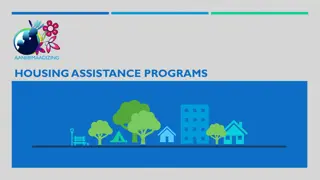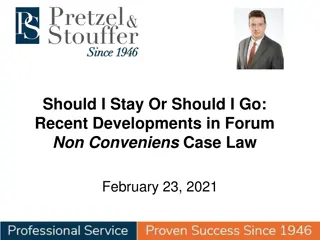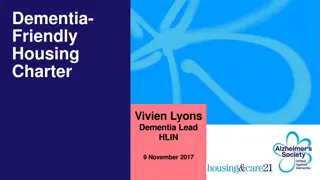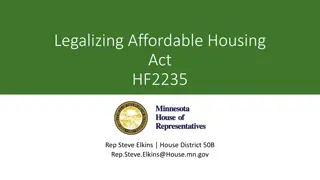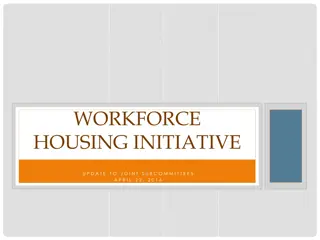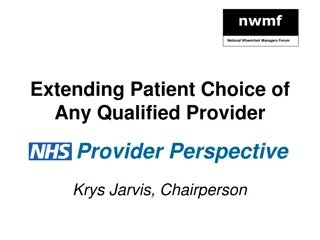Housing Best Practices Forum: Enhancing Housing Options and Resource Collaboration
Explore the key agenda items, logistical details, forum format, goals, and best practices review from a recent Housing Best Practices Forum. The forum aims to amplify housing choices, improve resource utilization, foster collaboration among stakeholders for innovative housing solutions, share success stories, and address policy hurdles to ensure integrated housing opportunities for all. Delve into topics such as supportive housing, Housing First approach, individualized housing options, Supreme Court mandates, evidence-based practices, and person-centered thinking.
Download Presentation

Please find below an Image/Link to download the presentation.
The content on the website is provided AS IS for your information and personal use only. It may not be sold, licensed, or shared on other websites without obtaining consent from the author.If you encounter any issues during the download, it is possible that the publisher has removed the file from their server.
You are allowed to download the files provided on this website for personal or commercial use, subject to the condition that they are used lawfully. All files are the property of their respective owners.
The content on the website is provided AS IS for your information and personal use only. It may not be sold, licensed, or shared on other websites without obtaining consent from the author.
E N D
Presentation Transcript
HOUSING BEST PRACTICES FORUM Welcome!
Agenda Welcome and Logistics Heidi Sandberg, DHS The Eviction Process Drew Schaffer, Mid-Minnesota Legal Aid Questions Success Story Joe Groshens, Options for Independence Program and policy updates Becky Melang, DHS Closing Becky Melang, DHS
Logistics (boring yet necessary) Hosts: Nichole Meyer, Wright County Sarah Tripple, Washington County Heidi Sandberg, DHS Alison Niemi, DHS Lots of Sites! Keep microphones muted, but let us know if you can t hear! No questions during presentation Questions during and after presentation to DHS Housing Options email: dhs.housingoptions@state.mn.us Follow up evaluation
Format of Forums Every other month (evens), third Monday, 1:30-3:30 Taped presentation and materials available post- session on mn.HB101.org (partners tab) Steering Committee to oversee agenda and topics
What are we hoping to achieve? More choices and control for people over their housing and services Leverage resources as best we can Collaboration between counties, tribes and providers to develop creative housing options for individuals Share success stories and best practices used in your community Forward identified policy/resource barriers to decision- makers Ultimate goal: Everyone has the opportunity to live in integrated housing of their choice.
Best Practices Review CSH Dimensions of Quality Building the capacity of supportive housing HCBS Settings Rule Ties best practices to funding Housing First Housing first without a requirement for "housing readiness" Individualized Housing Options Creative use of existing resources to design housing options centered around the person Olmstead Supreme Court requires opportunities for integration for people with disabilities PSH Evidence-Based Practice Ensuring quality housing for people with Serious Mental Illness Person-Centered Thinking Concrete, easy to use tools that can be accessed by anyone
[Session topic] and Housing Best Practices
[Presentation title] Drew Shaffer Managing Attorney, Mid Minnesota Legal Aid
EVICTION ISSUES Process and timeline, CLAIMS AND DEFENSES, Prevention, and Expungement
EVICTION TOPICS AND ISSUES Eviction basics Eviction process and timeline Reasons for eviction cases Defenses to eviction cases Resolving an eviction cases after it is filed Preventing eviction before it happens Effect of eviction case (or UD ) on rental history Legal standards for expungement Discretionary expungement Mandatory expungement Common law/inherent authority expungement Miscellaneous considerations
Eviction basics An eviction is a legal action to get a court order to force a tenant (or other person) to move from a house, apartment, or other dwelling. Eviction action refers to the legal court action and process to evict someone. Some people still refer to unlawful detainer cases or UDs they are talking about eviction actions. A notice to vacate or notice to quit is not an eviction action, though some people think of a notice to move as an eviction notice.
Eviction process and timeline A landlord can file an eviction action at any time the landlord believes the tenant is in default under the lease, including not paying rent on time or breaking a rule in the lease. A landlord files a complaint. The court issues a summons for the tenant to show up at a hearing in 7-14 days. The landlord serves the summons and complaint on the tenant. At the hearing most cases settle with repayment or move-out agreements.
Eviction process and timeline If the court enters judgment for the landlord, the landlord will be able to get a writ of recovery. The Sheriff delivers the writ to the property, giving the tenant 24 hours to move. If the tenant does not move, the Sheriff can remove the tenant from possession after 24 hours. The whole process unfolds over 2-4 weeks. So, a tenant with no defense usually has 2 weeks or so to move after getting served with court papers before the Sheriff will execute the writ.
EVICTION PROCESS AND TIMELiNE If the case does not settle and the tenant raises defenses, the court holds a trial. The court may order judgment for the landlord. The court may allow the tenant to redeem (pay to stay) in a rent case if the tenant owes rent. The court may order judgment for the tenant. Any judgment by the court is for possession only the landlord does not get a money judgment for unpaid rent. If the case does not settle and the tenant has no defenses, the tenant can ask for 7 days to redeem (in a rent case) or to move (in all cases).
REASONS FOR EVICTION There are three common reasons for eviction in landlord-tenant relationships: Nonpayment of rent Breach of lease Holding over after expiration of lease or notice to quit Nonpayment of rent is by far the most common reason for eviction. Breach of lease is second most common, including claims for noisy/disruptive behavior, police calls, unauthorized tenants/pets, and unpaid utility bills. Holding over claims are somewhat rare.
SOME DEFENSES TO ALL EVICTIONS Improper service of the court papers The tenant must be properly served 7 days before the court hearing. The landlord must strictly comply with the rules for serving eviction papers landlords frequently fail to follow the law on service by mailing and posting. Failure to disclose name and address of landlord or agent for service of process Some landlords use a post office box or commercial mailbox store address. Wrong filing party Failure of corporate landlords to act in court through an attorney
SOME DEFENSES TO EVICTION rent The tenant can redeem (pay to stay) by bringing the unpaid rent to court. The tenant can get seven days to pay the costs of the action (filing fee and process service fee). The tenant can claim habitability problems (called a Fritz defense) and pay unpaid rent into court to have the court decide if rent is owing. A landlord cannot evict a tenant after taking a partial payment of rent in arrears unless the landlord and tenant have a written agreement allowing this. A landlord cannot evict a tenant for illegal late fees that are over 8 percent of the unpaid rent.
Some defenses to eviction breach of lease A landlord must prove a breach with admissible evidence -- usually, that means testimony or other evidence from a witness with personal knowledge. For a landlord to evict for breach of lease, the breach must be material. A landlord may not evict a tenant unless there is a right of reentry clause in the lease. A landlord may waive the right to evict for breach of lease by accepting rent with knowledge of the breach. It is illegal to evict someone simply for calling for police or emergency assistance for domestic abuse or any other conduct.
SOME DEFENSES TO EVICTION HOLDING OVER CLAIMS To evict a tenant for holding over after a notice to quit, the notice must be proper. A notice generally must be effective at the end of a rent period (usually at the end of a month). A notice usually can t be effective in the middle of a month or given for a period of less than a month. Retaliation is a defense to an eviction claim for holding over past the move-out date in a notice to quit. If a tenant asserted her or his rights within the 90 days before a landlord s notice to quit, there is a presumption of retaliation. A landlord may waive a claim for eviction for holding over past the move-out date in a notice to quit.
RESOLVING an EVICTION CASe after it is filed Most eviction cases settle. A tenant should do the following in a settlement: Agree to realistic repayment or move-out terms. Put the agreement in writing. Be clear about whether or not a writ can issue for a breach of the settlement. Have the landlord to acknowledge any mistakes in filing. Have the landlord agree to support (or not to oppose) expungement. What is a reasonable settlement depends on the case. A tenant with a good defense has a basis for a middle-ground settlement that is better than a tenant in the same situation with no defense.
PREVENTING EVICTIONS BEFORE THEY HAPPEN Pay your rent and obey your lease. A tenant should maintain good lines of communication with a landlord. It is usually best to let a landlord know if a problem arises to try to prevent a filing based on incomplete or inaccurate information. Try to settle a dispute to avoid an eviction court filing. If the landlord will not work out a pre-filing settlement, then the tenant can move to try to avoid an eviction court filing. This may be a better outcome than facing an eviction in court and all of the consequences that go along with the filing.
FINAL THOUGHTS ON EVICTION Evictions move quickly by design. Often, neither side has an attorney in an eviction case. There are many defenses that arise in eviction cases landlords and tenants should seek legal advice to avoid mistakes and to identify legal issues. Identifying defenses and raising them can be important to improve a tenant s chances for a good settlement or victory in court. Part of the goal in assisting a tenant facing eviction should be planning to set the case up for a later expungement motion.
LEGAL Resources for people facing eviction Hennepin County Mid-Minnesota Legal Aid: (612) 334-5970 Housing Court Project (Legal Aid and Volunteer Lawyers Network) Location: Housing Court, 3rdFloor Henn. Cty. Gov t. Ctr. Hours Monday through Friday: 12:30 p.m.-4:00 p.m. Tuesday, Wednesday, and Friday: 8:30 a.m.-noon Ramsey County St. Paul Legal Aid Office: (651) 222-4731 Other Counties There is a legal services program serving every county in Minnesota.
Basic considerations iN RequestiNG EXPUNGEMENT Generally, court files are public Expungement erases the public record of an eviction action Extraordinary to make a court action a secret from the public Generally, expungement is discretionary
Effect of eviction case on rental history of a tenant Mere filing of eviction case creates public record Record remains public regardless of outcome, even if case is dismissed or tenant wins judgment on the merits Eviction case records preserved indefinitely in the Minnesota Court Information System (MNCIS) Eviction case filings tracked by tenant screening agencies Local, specialized credit reporting agencies Eviction case records can be reported for seven years One eviction case in rental history will often lead to denial of rental application If application is approved, eviction case in rental history may lead to double damage deposit, rent premium, month-to-month lease instead of term lease, etc.
LEGAL STANDARD DISCRETIONARY EXPUNGEMENT Minn. Stat. 484.014, subd. 2 The court may order expungement of an eviction case court file only upon motion of a defendant and decision by the court, if the court finds that the plaintiff's case is sufficiently without basis in fact or law, which may include lack of jurisdiction over the case, that expungement is clearly in the interests of justice and those interests are not outweighed by the public's interest in knowing about the record.
Legal standard discretionary expungement Three-part test for discretionary expungement: Whether case was sufficiently without basis in fact or law Whether expungement is in the interests of justice Whether interests of justice are outweighed by the public s interests in knowing about the record
Legal standard discretionary expungement Interpretation and application of test First part of test lack of sufficient basis in fact or law may be determinative of a Motion for Expungement in Hennepin County District Court Met by showing a jurisdictional, procedural, or substantive defect May hinge on interpretation and application of law governing claimed defect in the case No defect in case expungement unlikely Recent trend in emphasis on second and third parts of test May be helpful to have evidence of denial of rental application based on record of eviction case Useful to describe family circumstances and importance of housing stability for the moving party Dependent on venue learn as much as possible about the audience for the argument
LEGAL STANDARD MANDATORY EXPUNGEMENT Minn. Stat. 484.014, subd. 3 The court shall order expungement of an eviction case commenced solely on the grounds provided in section 504B.285, subdivision 1, clause (1), if the court finds that the defendant occupied real property that was subject to contract for deed cancellation or mortgage foreclosure and: (1) the time for contract cancellation or foreclosure expired and the defendant vacated the of the eviction action; or (2) the defendant was a tenant during the contract foreclosure redemption period and did 504B.285, subdivision 1a, 1b, commencement of the eviction case. redemption has property prior to commencement cancellation or not receive a notice under section or 1c, to vacate on a date prior to
LEGAL STANDARD INHERENT AUTHORITY Tests from State v. C.A., 304 N.W.2d 353 (Minn. 1981) Whether expungement is necessary to the performance of a judicial function Whether expungement will yield a benefit to the moving party commensurate with the disadvantages to the public from the elimination of the record and the burden on the court in issuing and enforcing the order
LEGAL STANDARD INHERENT AUTHORITY Common law inherent authority standard Derived from interpretation of separation of powers doctrine under state constitution Exercise of relief under standard is discretionary and equitable test of fairness under particularized facts and circumstances Now explicitly acknowledged in eviction judgment statute Minn. Stat. 504B.345, subd. 1(c)(2) State v. M.D.T., 831 N.W.2d 276 (Minn. 2013) Expungement of criminal records held by the executive branch not necessary to the performance of a unique judicial function
PROCEDURE Motion Statutory elements Argue defects in the record of the case or provable facts that show lack of factual or legal basis for the case Cite to statute, rule, or case that is authoritative or persuasive on any claimed defect Include supporting documents and photographs as exhibits Explain injustice or hardship resulting from record of the case, with supporting evidence Explain how or why the record of the case not of interest to the public Inherent authority Outline of sympathetic facts and circumstances Opportunity for creativity
PROCEDURE Basic steps and timeline: Draft Motion and Affidavit to Proceed In Forma Pauperis for verification by the defendant/tenant E-File (or File at Housing Court if Pro Se) IFP Affidavit and Motion with Supporting Exhibits (and a Certificate of Representation, if applicable) Court issues IFP Order and schedules hearing, typically 4-8 weeks after filing of Motion in Hennepin County Court issues Order on service of Motion and filing of Affidavit(s) of Service E-Serve (and/or Mail) Motion, Exhibits, and Order at least 10 days prior to hearing E-file (or File at Housing Court if Pro Se) Affidavit of Service at least 3 business days before hearing
Factors affecting the outcome of an expungement motion Primary factor favoring expungement An undisputed or proven jurisdictional, procedural, or substantive defect in the eviction case Examples of legal issues expungement Improper service of the Summons and Complaint Filing of the action by the wrong plaintiff Landlord s failure to disclose a street address at least 30 days prior to commencement of the eviction action Serious habitability problems Landlord s waiver of claim by acceptance of rent Mootness of case (tenant moved out before action commenced) potentially supporting
Factors affecting the outcome of an expungement motion Additional factors favoring expungement Past success dismissal or judgment for tenant Lapse of time since eviction case was filed(5-10 years) Lack of other eviction cases in the tenant s rental history Lack of opposition to Motion Demonstration of actual harm caused by the existence of the record (e.g., multiple denials of applications for housing or credit, double- or triple-rent security deposit, etc.) Credibility and positive, respectful demeanor at the hearing
FACTORS AFFECTING THE OUTCOME OF AN EXPUNGEMENT MOTION Primary factor weighing against expungement Lack of undisputed or proven defect in the case Additional factors weighing against expungement: Extraordinary nature of relief elimination of public record Tendency to consider substance over procedure, e.g., unpaid rent at the time of the filing of the eviction case Procedural history Default judgment against tenant Judgment against tenant for failure to meet deadline imposed by court Violation of settlement agreement by tenant Recency of case Opposition by the landlord Settlement of case without having raised or reserved issues for later Motion
STEPS AFTER MOTION GRANTED Court will expunge/erase the public record of the case File purged and MNCIS entry deleted Important to check to make sure this happens General timeline is 2-4 weeks after order granting Motion Tenant must notify local tenant screening agencies to delete references to the case in their records Letter and copy of expungement order http://povertylaw.homestead.com/ResidentialUnlawfulDetai ner.html
List of tenant screening agencies Rental Research Services, Inc. 7525 Mitchell Road, Suite 301 Eden Prairie, MN 55344 (952) 935-5700 www.rentalresearch.com info@rentalresearch.com Apartment Services Plus (ASP) 6110 Blue Circle Drive, Suite 275 Minnetonka, MN 55343 (952) 925-9592 www.aspscreening.com production@aspscreening.com Twin City Tenant Check 910 Ivy Avenue East St. Paul, MN 55106 (651) 224-3002 www.tcofmn.com info@tcofmn.com Multi-Housing Credit Control (MCC) 10125 Crosstown Circle, Suite 100 Eden Prairie, MN 55344 (952) 941-0552 www.mccgrp.com consumercare@mccgrp.com First Check 6910 Idsen Avenue South Cottage Grove, MN 55016 Rental History Reports, Inc. 701 Fifth Street South Hopkins, MN 55343 (952) 545-3953 http://www.rentalhistoryreports.com/ https://www.rentalhistoryreports.com/contact /index.php
Miscellaneous issues and considerations Discrepancy in file maintenance and MNCIS record Up until mid-2012, paper files for non-judgment cases were destroyed after one year but MNCIS record remains Can be used to tenant s advantage the public has an interest in complete and accurate records Requesting immediate expungement in cases in which tenant prevails Defect that leads to dismissal/judgment for tenant is probably a solid basis for expungement New statute: Minn. Stat. 504B.345 Option to seek judge review if Motion is denied Good option if issue for review regards interpretation and/or application of the law governing a claimed defect in the case
CONTACT INFORMATION Drew P. Schaffer, Managing Attorney Mid-Minnesota Legal Aid 430 First Avenue North, Suite 300 Minneapolis, MN 55401-1780 Electronic Mail: dpschaffer@mylegalaid.org Telephone/Facsimile: 612.746.3644 Legal Aid Intake: 612.334.5970
Success stories Joe Groshens, Options for Independence
Wrap-up Comments or questions? DHS Housing Options email: dhs.housingoptions@state.mn.us Presentation and materials available: http://mn.hb101.org/ Complete evaluation Future sessions Take some time to network!
Steering Committee Members Kate Erickson, Department of Corrections Heidi Sandberg*, DHS (Section 811) Vicki Farden, Minnesota Housing Finance Agency (Supportive Housing) Alicia Smith, DHS (Indian Policy) Ed Sootsman, Hennepin County Colleen Fodness, Dakota County Nan Stubenvoll, DHS (Alternatives to Foster Care) Julie Grothe, Guild, Inc. Mari Moen, DHS (Direct Care and Treatment) Lynette Studer, DHS (Transition to Community) Jeannie Nelson, DHS (Moving Home Minnesota) Gary Travis, DHS (PATH, PSH) Sarah Tripple*, Washington County Becky Melang, CSH Julia Welle Ayres,* DHS (Housing) Nichole Meyer, Wright County Dianne Wilson, DHS (Alcohol and Drug Abuse Division) Alison Niemi*, DHS (Housing) Kelsey Nyline, Fraser Leah Zoladkiewicz, Department of Human Services (DHS) (HCBS) Stacey Ray, Catholic Charities *Planning Committee Members




